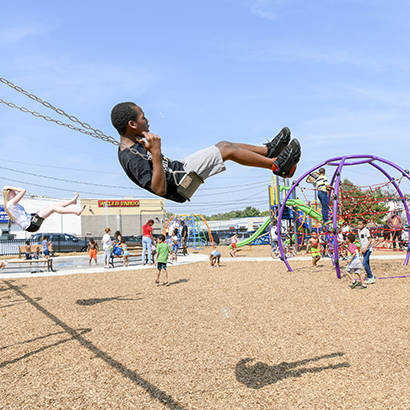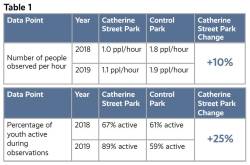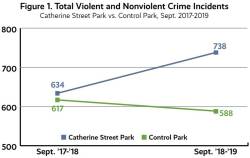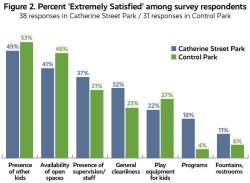
For an enhanced digital experience, read this story in the ezine.
Year One report underwritten by Active Network, LLC, and BCI Burke Company, LLC
The National Recreation and Park Association (NRPA), with generous support from its Parks Build Community (PBC) Research Partners, BCI Burke Company, LLC, and Active Network, LLC, is conducting a five-year longitudinal evaluation of the health, public safety and economic impacts of its Baltimore PBC project. This project, completed in September 2019, renovated Catherine Street Park in the Carrolton Ridge neighborhood to the west of downtown.
NRPA, in conjunction with the research project’s principal investigators, J. Aaron Hipp and William Beam of North Carolina State University, began data collection in December 2018 shortly before construction began. The evaluation will end in December of 2023, producing one year of pre-renovation data and four years of post-renovation results.
What We Know from Year One Data Collection
To date, we have collected one round of pre- and post-renovation data related to physical activity in the parks, as well as pre-renovation data related to public safety, economics and community perceptions. Below is a summary of our conclusions.
Physical Health – In December 2018 and 2019, we conducted 52 hours of observations in the parks to analyze how often people were using each space, and how often they were physically active when doing so.
Due to the observations occurring in December, we noted light usage in both Catherine Street Park and the control park — a similar-sized park in a neighborhood with similar demographics and social economic status — in 2018 and 2019. However, for Catherine Street Park, children were much more physically active following the renovation compared to the control park (see Table 1).
Given the concerns over COVID-19, the evaluation team is currently working with the community to determine the best way forward to hear ongoing feedback around the project, given health concerns, as well as maintenance and construction challenges also stemming from the pandemic.
Public Safety – Figure 1 is a visual showing crime levels in the areas immediately around the parks. Catherine Street Park experienced a significant increase in crime while the park was closed for renovation.
There is a growing body of research showing correlations between park and green-space renovations and crime reduction. We will analyze trends over time and compare these results with community perceptions around safety to get a full understanding of the renovation’s impact.
Economics – 2019 property assessment data reveals low property values in both neighborhoods around each park. The median home values were around $15,000 and $14,000 for Catherine Street Park and the control park, respectively, with most of the properties being valued at less than $30,000 (the red-, orange- and yellow-colored buildings on the maps).
Baltimore City re-assesses properties every three years, meaning we will have only one period of post-construction data collection (2022) to assess the renovation’s impact. We will analyze property values from 2013 to 2016 so that we can better determine the difference that the Catherine Street Park renovation is making. As we have seen throughout the United States, COVID-19 is likely to impact not only the evaluation of this project, but also the community around the park far beyond the present time.
The data source for the public safety and economic data is the Baltimore City government.
Community Perceptions – According to a Summer 2019 survey conducted prior to the park’s reopening, residents were dissatisfied with each park space on a number of fronts — from the quality of amenities to the lack of programming opportunities for the community (see Figure 2).
NRPA is still determining when to safely conduct surveying given current public health challenges. In the final summer of community data collection, July 2023, we will conduct longer interviews with community members to give us a richer understanding of the renovation’s impact.
Conclusion
It is too early to know the renovation’s impact on the health, public safety and economics around Catherine Street Park, but the increases we have seen thus far in children’s physical activity are promising. NRPA will update this report on an annual basis to inform all stakeholders of our latest data and conclusions.
Kevin Brady is NRPA's Senior Evaluation Manager. J. Aaron Hipp is Associate Professor of Community Health and Sustainability in the Department of Parks, Recreation and Tourism Management at North Carolina State University. William Beam is a Graduate Assistant in the Department of Parks, Recreation and Tourism Management at North Carolina State University.





